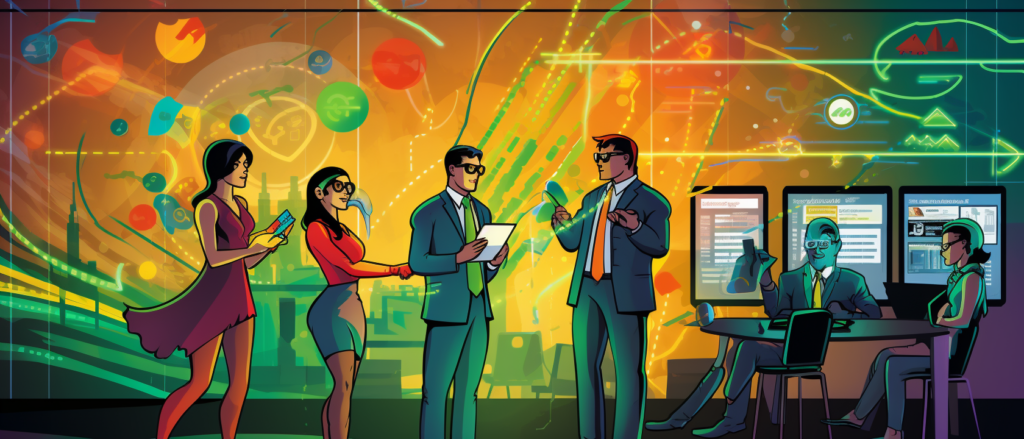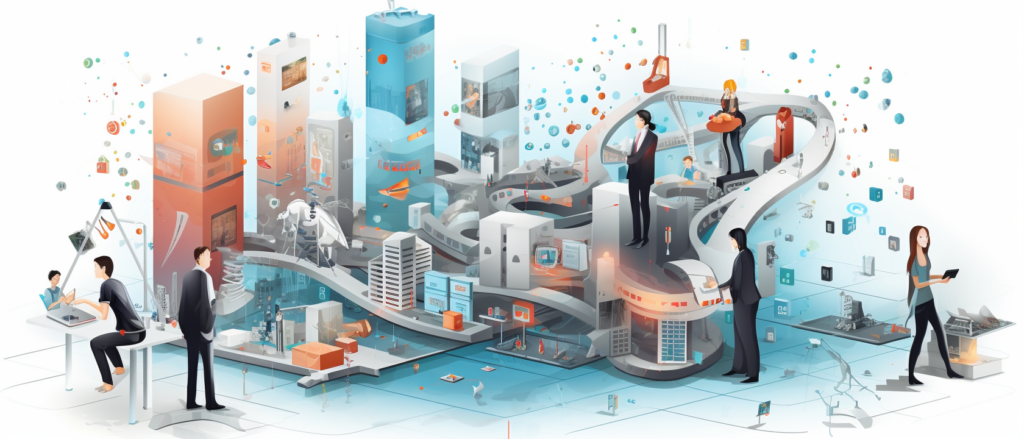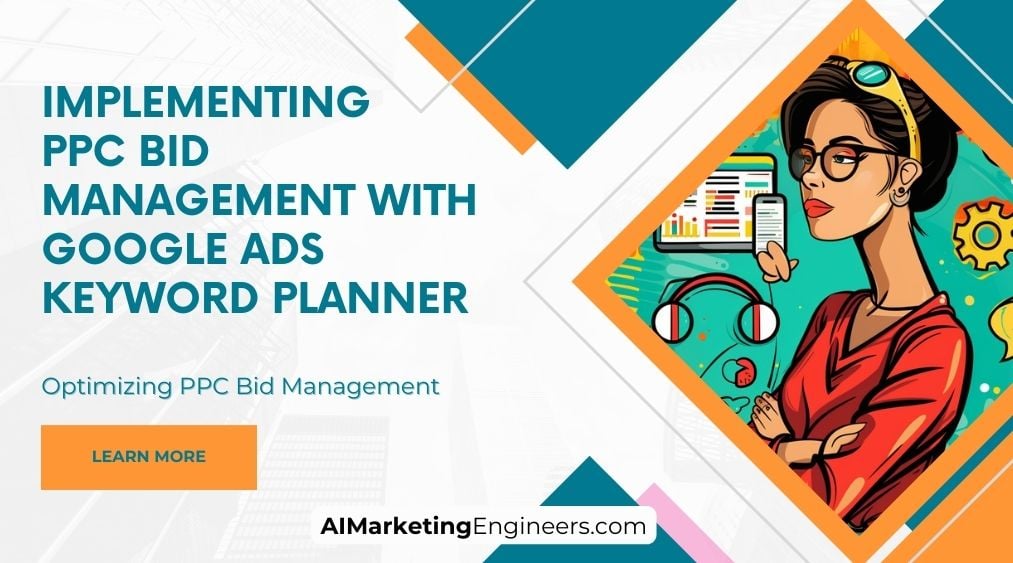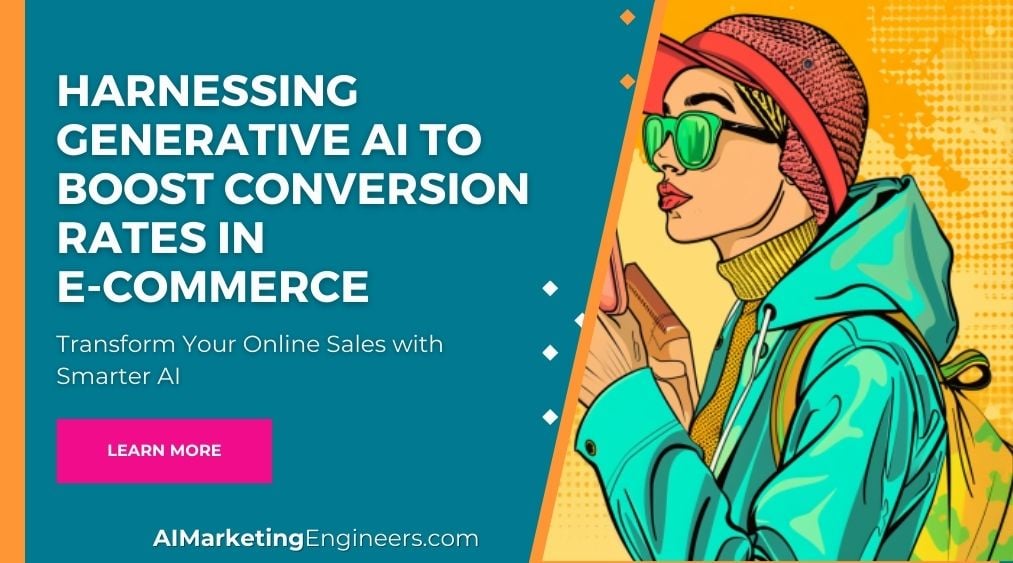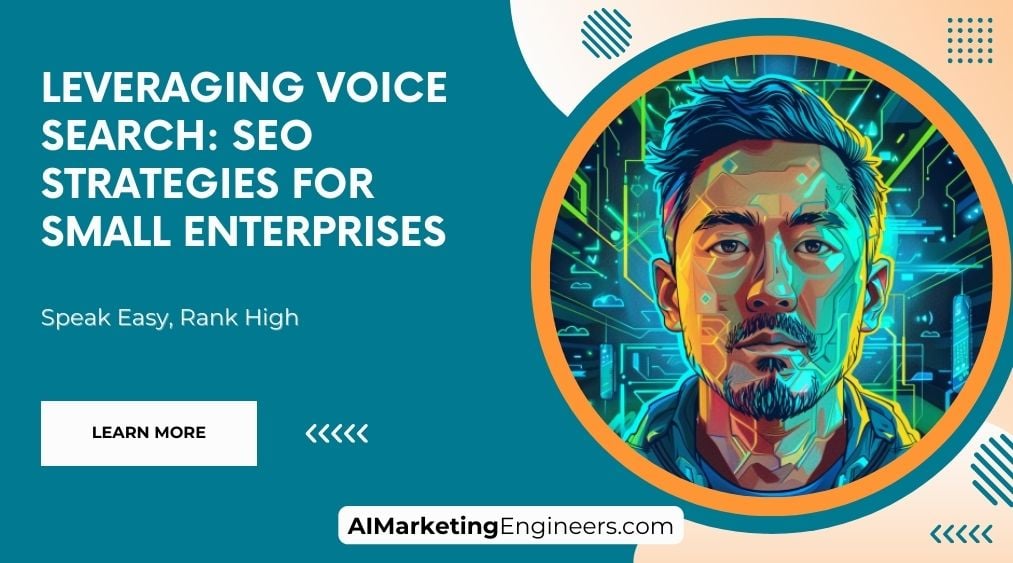Key Takeaways
✅ Data-Driven Decision Making: It's all about making smart moves. AI cranks up your marketing strategy's strength by turning data into crystal-clear insights. Imagine knowing exactly where to play your cards in the vast marketplace. AI is that whisper in your ear, helping you call the shots with confidence.
✅ Personalization and Customer Experience: Ever wondered why some brands just 'get you'? AI's genius trick is to make every customer feel like the VIP of their own story. Goodbye one-size-fits-all, hello tailored experiences that stick in people's minds – and hearts.
✅ Adaptability and Agility: Markets change fast, like quicksilver. But what if your strategy could change faster? AI equips you to leap onto new trends and swing around roadblocks with the grace of a gazelle. Now that's the kind of agility that keeps you steps ahead of the game.
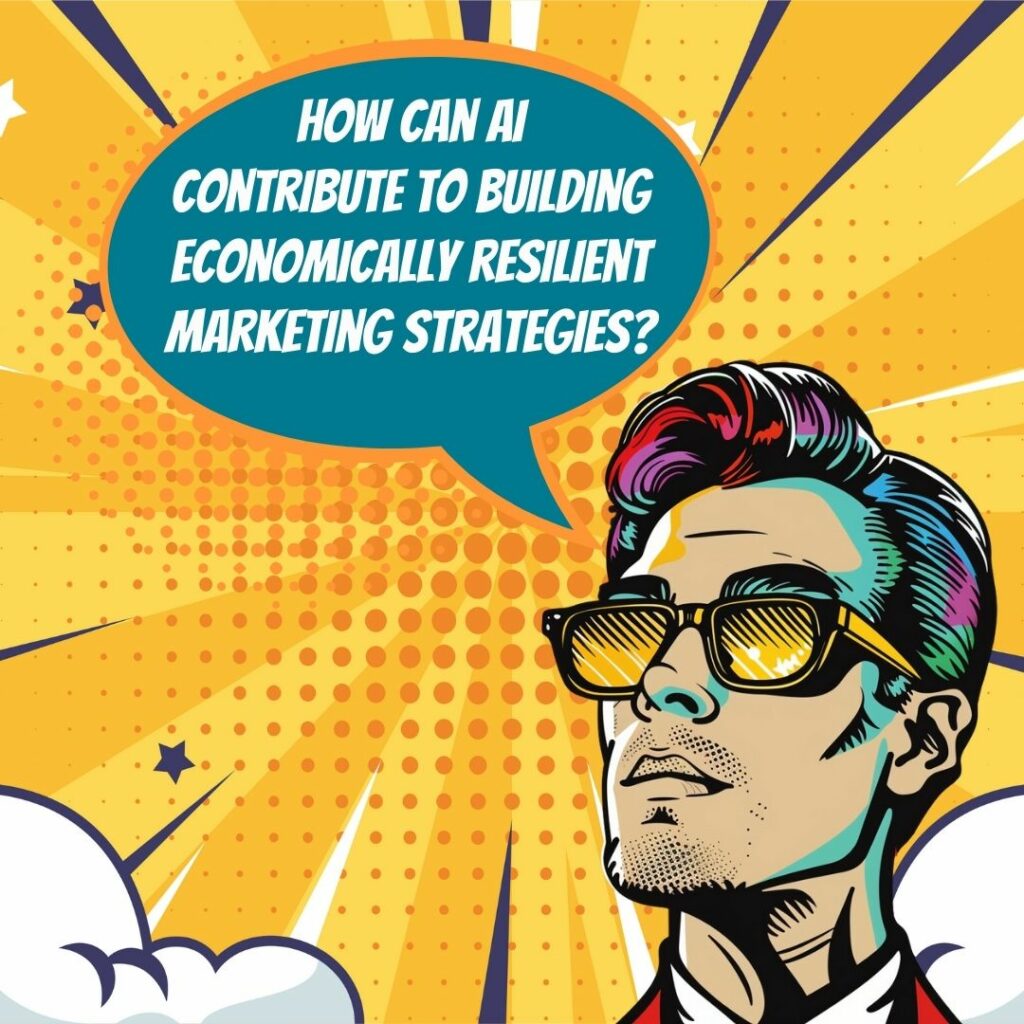
Introduction
Have you ever thought about what it takes to make your marketing strategy truly unbreakable? Like, solid-as-a-rock unbreakable. In an economy that's as predictable as the weather (which is to say, not at all), building economically resilient marketing strategies is your ticket to peace of mind. And guess what? AI is the secret sauce to getting there.
Picture this: every move you make is backed by a powerhouse of data, your customers are loving the bespoke treatment they get, and your brand dances through market changes like it was born for the spotlight. This isn't just some pipe dream; it's the real, tangible future of marketing with AI by your side.
Intrigued? Hold on to your hats, because we're about to slice through the hype and lay out some hard-hitting ways that AI can supercharge your strategy and keep your ROI smiling. Let's get you prepped for tomorrow, shall we?
Top Statistics
| Statistic | Insight |
|---|---|
| Market Growth: The global AI in marketing market size is projected to reach $35.97 billion by 2026, a spike from $15.84 billion in 2020. (Source: Business Wire, 2021) | That's quite an increase, isn't it? Companies seem to be voting with their wallets for AI, confirming its pivotal role in crafting future-proof marketing strategies. |
| Customer Service AI: By 2025, 95% of customer interactions will be facilitated by AI (Source: Servion, 2020) | Imagine nearly every time you reach out for help, there's an AI ready to assist. Businesses are banking on this to provide quick, reliable customer service. How does that make you feel? |
| Personalization Comfort: 60% of consumers are comfy with AI-driven personalization in shopping. (Source: Accenture, 2019) | People are warming up to AI knowing their preferences. This trust could pave the way for smarter marketing, making it easier to find things you love. Do you prefer the personal touch? |
| Business Value: AI could usher in a whopping $1.2 trillion in business value by 2025 (Source: Gartner, 2019) | Businesses are eyeing AI not just as a tool, but as a transformational force. They're hoping AI is the golden ticket to staying ahead of the curve. Could this be the nudge companies need? |
| AI in Advertising: The AI-powered advertising market is expected to skyrocket, with a CAGR of 30.6% through to 2028 (Source: Grand View Research, 2021) | Ads powered by AI? It's looking like a future where advertisements might know what we want before we do. Thrilling or a tad spooky? Either way, it's a game changer for the industry. |
Understanding AI in Marketing
Ever wonder how some companies seem to know exactly what you want? That's AI in marketing for you. At its core, AI in marketing is about smart machines analyzing heaps of data to predict what you're likely to buy next. But it's not just about predictions; it's also about engagement. Think chatbots that answer your questions in a flash or email campaigns that hit your inbox at just the right time. AI applications in marketing can range from data analysis to content generation, making tasks a lot quicker and often more accurate than humans could hope to do.
Data-Driven Decision Making
Making decisions without data is like trying to hit a bullseye blindfolded. Data-driven decision making is king in crafting a marketing strategy that can weather economic storms. AI excels at digging through mountains of data to unearth insights that would take us mere mortals an age to find. Tools powered by AI, like Google Analytics or Adobe Sensei, go about collecting, analyzing, and interpreting data, giving marketers the knowledge they need to make smart, informed decisions. Ever wondered how a small tweak in your campaign could change things? AI can give you an answer.
Personalization and Customer Experience
Imagine walking into a store where the salesperson knows your style, your size, and exactly what you came for. That's the level of personalization AI is bringing to online shopping. AI's role in personalizing marketing is pivotal in creating an experience that keeps customers coming back for more. And it's not just about selling – AI-powered chatbots and recommendation engines are like your personal shopping assistants, guiding you to what you need and often what you didn't realize you wanted. It creates a shopping experience that feels incredibly tailored, almost like magic.
Predictive Analytics and Forecasting
Have you ever tried to guess what’s going to be the next big thing in your market? That's where predictive analytics and forecasting come into play. By using AI, marketers can anticipate future trends and consumer behavior. This isn’t just crystal ball stuff; AI uses real data and patterns to make these predictions. Companies like Netflix use predictive analytics to suggest shows you might like, making sure you stay glued to your screen. In marketing, knowing what customers will want tomorrow, next month, or even next year is the golden ticket.
Efficient Resource Allocation
You wouldn't want to pour all your money into something that's not working, right? That's where AI steps in to ensure your marketing budget isn't going down a black hole. AI's role in optimizing marketing budgets ensures your dollars are working as hard as they can. By using AI-driven marketing automation tools, you can be sure that every penny is spent wisely, automating campaigns across various platforms, and fine-tuning them in real-time. But it's not just about saving money – it's about increasing your return on investment (ROI). By measuring the ROI of AI-powered marketing strategies, companies can see which tactics are turning leads into customers and adjust accordingly.
By integrating AI into your marketing strategy, you are setting up for not just survival but success, ensuring your brand remains robust, no matter what the financial forecast may look like. Have you thought about how AI might transform your own marketing efforts? Could it be the missing piece in your puzzle to withstand the economic tides?
AI Marketing Engineers Recommendation
Recommendation 1: Implement AI-driven data analytics to forecast market trends: Use AI algorithms to analyze large datasets and predict consumer behavior shifts. You can tap into social media, online shopping patterns, and search trends to anticipate what your customers might need before they know they need it. By forecasting these trends, you're not just prepared—you're a step ahead, and that's a fine place to be when you're weathering economic storms.
Recommendation 2: Develop dynamic pricing strategies using AI models: AI can help you adjust your pricing in real-time based on supply and demand, competitor pricing, and market conditions. This means you can stay competitive without sacrificing margins. It's also about fairness; when times are tough, your customers will appreciate prices that reflect the current state of their wallets.
Recommendation 3: Leverage AI for efficient ad targeting and budget allocation: With programmatic advertising, you can pinpoint where to place your ads for maximum effect and alter your spending based on ad performance and economic factors. This way, every penny of your ad budget is used as effectively as possible. Your ads show up where they'll do the most good—like finding the perfect spot for a billboard in the digital world.
Relevant Links
- Unlock Passive Income with Affiliate Marketing Mastery in 2024!
- ChatGPT Showdown: Free vs Paid - Make the Smart Choice!
- Turbocharge Your Content with ChatGPT: A Marketer's Secret Weapon!
- The Power of Prompt Engineering: Unleash Your ChatGPT's Full Potential!
- Small Business Growth: How ChatGPT Can Give You the Edge!
Conclusion
Let's take a moment to breathe and think about everything we've chatted through. How does AI in marketing feel to you now? Kind of like a secret weapon for staying strong through the storms in the market, right? Well, AI isn't just a fancy buzzword; it's a tool that could make or break your marketing resilience. We've seen how data-driven decision making is no longer a choice but a must-have – with AI sitting at the core, ready to crunch numbers and patterns that you and I wouldn't even know where to start with.
Imagine a world where you know what your customer wants before they do – that's personalization at its best, courtesy of AI's clever insights. And let's not forget those predictions that have us feeling like fortune tellers, except these predictions are backed by predictive analytics and real data, not crystal balls. We're allocating resources with precision now, not guesses, which means every dollar you put into your marketing strategy is working as hard as you do.
So, where does this leave us? If you're not already on the AI train, now's the time to jump on. Think about it: can you afford to be left behind while your competitors forecast, personalize, and economize their way to success? Sure, change can be scary, but the hope here is to equip yourself with something so robust that no matter what the economy throws your way, you're ready.
Remember, building an economically resilient marketing strategy isn't just about surviving; it's about thriving. And with AI by your side, you're set to do just that. Have you started considering how AI will play a role in your future strategies? If not, what's holding you back? Let's keep the conversation going and keep our eyes on the prize: a marketing strategy that's not just smart, but also tough enough to take on whatever comes next.
FAQs
Question 1: What is an AI-driven marketing strategy, and why is it important?
Answer: An AI-driven marketing strategy leverages artificial intelligence to comb through data, get a read on customer behavior, and make some of those repetitive marketing tasks happen without a human having to push the buttons every time. It's a big deal because it means we can chat with customers in a way that feels super personal without actually having to sit down and write out every single message, saving time and seriously boosting the chances of making a sale.
Question 2: How can AI improve customer segmentation and targeting?
Answer: Picture AI like a super-smart assistant that can sift through mountains of customer info and spot trends faster than any human. This type of tech can split customers into groups with ninja-like precision, helping you to send out the kind of offers and messages that feel like they were made just for them, right when they're most likely to take a peek.
Question 3: What role does AI play in content creation and optimization?
Answer: AI is like a backstage crew for content — it can help write stuff, pick out what people are really into, and keep an eye on what the competition is up to. AI is all about getting your content to the right people, on the right platforms, at the right time.
Question 4: How does AI enhance customer experience and engagement?
Answer: AI is like having a chatty, helpful concierge who's always there to chat with customers, day or night. It can get ahead of what customers might need, making sure that every interaction they have with your brand leaves them wanting to come back for more.
Question 5: Can AI help with marketing campaign optimization and attribution?
Answer: Yup, AI turns into sort of a detective, digging through all the data from your marketing campaigns, figuring out what's working and what isn't. It also plays a role in connecting the dots, showing you exactly what’s making customers hit 'buy'.
Question 6: How does AI contribute to building economically resilient marketing strategies?
Answer: AI is like a trusty sidekick in the rough-and-tumble world of business. It helps you make decisions based on cold, hard data, gets more bang for your marketing buck, and automates a lot of the grunt work. When times are tough, AI can help you hold onto your customers and even find new ones without breaking the bank.
Question 7: What are some common challenges in implementing AI-driven marketing strategies?
Answer: It's not always smooth sailing — sometimes the data isn't all there, or it's a mess. Getting AI to play nice with the tools you've already got, finding folks who know how to run the AI show, and keeping everyone's info on the down-low can all be pretty tricky.
Question 8: What are some best practices for implementing AI in marketing?
Answer: The smart move is to be crystal clear about what you want to achieve, make sure your data is top-notch, invest in AI tech that fits what you need and the people who know how to use it, and never stop testing and tweaking.
Question 9: How can marketers stay up-to-date with the latest AI developments and trends?
Answer: Keeping up with AI is like having your finger on the pulse; read up on all the latest stuff, hit up conferences, webinars, and all that jazz, follow the big brains on social, and dive into chats and forums where folks are talking shop about AI.
Question 10: What are some popular AI tools and platforms for marketing?
Answer: There are a bunch of go-to tools that marketers are buzzing about, like HubSpot, Salesforce Einstein, Adobe Sensei, Google Analytics 360, and IBM Watson Marketing. These platforms can make you feel like a marketing superhero with all the AI powers they pack.
Academic References
- Ransbotham, S., Kiron, D., Gerbert, P., Reeves, M., & Spira, M. (2018). Artificial Intelligence and Marketing: What Managers Need to Know. MIT Sloan Management Review. This article shines a light on the crucial role of AI in the realm of marketing. It paints a picture for managers on how to weave AI into their strategies, highlighting the absolute must-haves of data-driven decisions, the art of trial and error, and the essential collaboration between marketing maestros and IT wizards.
- Kumar, A., Dhar, R., & Gupta, S. (2018). Artificial Intelligence and Its Implications for Marketing Strategy. Journal of Marketing, 82(6), 1-17. Imagine marketing having its own crystal ball—this is what the authors invite managers to do when considering AI's transformative powers. From personalizing the pitch to engaging the customer, this piece delves into how AI can buff up a marketing strategy, making it not just strong, but economically unshakeable.
- Pauwels, K. (2019). Artificial Intelligence for Marketing: The Cutting Edge of Practice and Research. Journal of Marketing, 83(2), 121-135. Ever wonder what the AI buzz is all about in marketing? Koen Pauwels draws you a map, showing where we are and where we could head next. This article is your go-to for understanding how AI can be the secret sauce to designing marketing strategies that stand tall when the economic winds blow.
- Venkatesan, R., & Lecinski, J. (2019). AI for Marketing and Product Innovation. California Management Review. The dynamic duo, Raj and Jim, dive into AI's pool of possibilities for marketing and product creation. Want to know how AI can be your ally in comprehending customer needs, creating a personalized experience, and keeping your marketing machine well-oiled? Here's your guide.
- Alkhateeb, A., Al-Hawari, A., & Al-Shboul, M. (2020). The Impact of Artificial Intelligence on Marketing Strategy: A Systematic Literature Review. Technological Forecasting and Social Change, 157, 120092.
This is more than an article—it's a treasure trove of what has been written about AI and marketing smarts. By exploring key themes and discoveries, including how AI deepens customer insights and customizes outreach, it offers a virtual megaphone for the role of AI in making your marketing strategy economically resilient.

